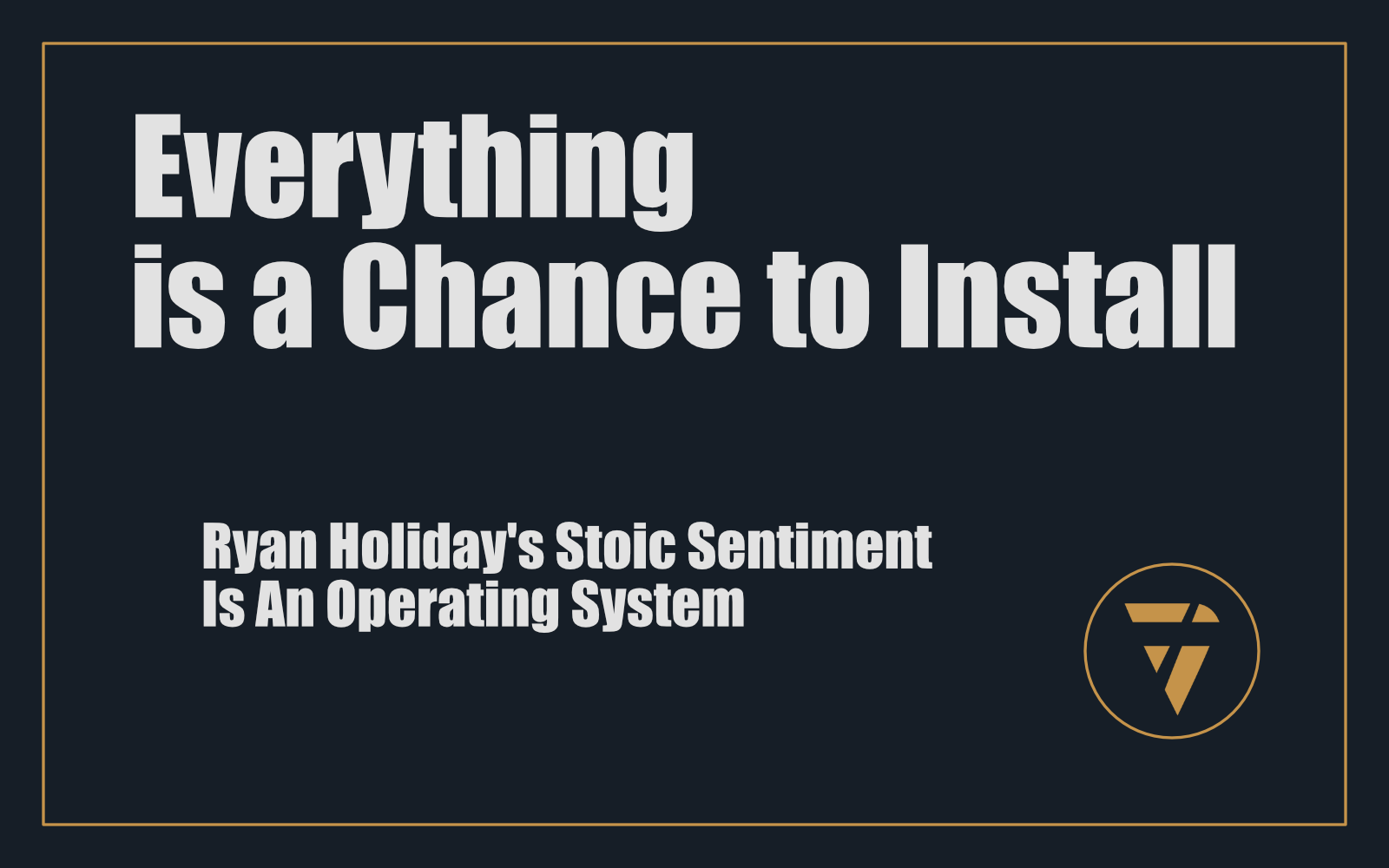Everything is a Chance to Install

Ryan Holiday's Stoic Sentiment Is An Operating System
You don’t need another motivational quote.
You don’t need another stoic anecdote from Aurelius or Seneca.
You need to install the architecture that converts chaos into consequence.
I. THE ROT: WHEN RESPONSE BECAME RETREAT
We live in an age of reaction.
Not action. Not sovereignty.
Reaction.
Watch them.
Executives waiting for permission.
Founders waiting for the market.
Teams waiting for the quarterly memo to decide if they should move.
But drift isn’t always loud.
Sometimes it looks like patience.
Sometimes it sounds like positivity.
“Everything happens for a reason.”
“Just focus on what you can control.”
“Trust the process.”
Language dressed up as strength. But inside?
Powerlessness in disguise.
Here’s the truth they won’t say out loud:
Most people don’t choose how they respond.
They cope.
They tolerate.
They endure.
But they don’t choose. They don’t decide.
Because decision is a violent act.
It kills the excuse. It removes the alibi.
And it ends the fantasy that this is all happening to you.
That’s what Ryan Holiday is trying to whisper in this latest piece.
I don’t whisper. :)
I systematise.
Because everything is a chance to respond is not just a philosophy.
It’s a system.
And it only works if it moves.
So here’s how to move.
II. THE LENS: REPLACEMENT VS REACTION
You’ve been told that mindset matters.
But mindset without mechanics is mood.
Here’s the real model:
- The Situation is neutral.
- Your Response defines the system.
- Your Install determines the leverage.
Example:
A client ghosts.
Most freeze. Worry. Wait.
But you? You see the ghosting as a system failure.
Not personal. Not emotional. Structural.
You isolate the flaw.
Maybe it’s the onboarding window.
Maybe it’s unclear scope.
Maybe it’s authority loss post-sale.
You don’t react.
You replace.
You build the anti-ghost protocol into your sales cycle.
Now that pain has become product.
That’s sovereign response.
You don’t just interpret it differently.
You install a system that makes it irrelevant next time.
That’s how you turn suffering into software.
III. THE STRATEGY: FROM STOIC TO SYSTEMATIC
Holiday’s piece gives us the principle: You always have a choice in how you respond.
Good. True. But incomplete.
What’s the full doctrine?
Every moment, you are handed one of three forms of input:
- Friction (resistance, rejection, delay)
- Failure (loss, error, exposure)
- Freefall (chaos, breakdown, collapse)
Each input creates an instinctive urge:
- Defend against friction.
- Distance from failure.
- Freeze in freefall.
But this is the operating shift:
Every input is an install request.
Every failure is a system void asking to be filled.
You don’t just cope with what happened.
You compress it.
You systematise it.
You build from it.
This is not resilience.
This is architecture.
And here’s the formula:
- Identify the structural root of the input.
- Convert that root into a friction map.
- Deploy a countermeasure that never allows that failure again.
This is not just philosophy.
It’s a ledger.
Everything becomes infrastructure.
Everything earns its place in your system.
Nothing is wasted.
IV. THE MYTH: YOU CAN’T CONTROL THE WORLD
This is the lie most founders still believe:
“I can’t control what’s happening out there.”
True. But irrelevant.
Because you don’t need to control what happens.
You only need to control what enters your system.
What you absorb.
What you respond to.
What you deploy from.
You want a sovereign system?
Here’s the rule:
No external input enters your world without conversion.
- A delay becomes a pace strategy.
- A failure becomes a fixable module.
- A betrayal becomes a filter protocol.
- A recession becomes a reprice engine.
Nothing passes through unconverted.
You don’t absorb the market.
You refine it.
You distill it.
You convert it into code.
That is what it means to operate with consequence.
V. THE POWER: HOW SOVEREIGNS RESPOND
Let’s enter the Room.
You walk in with failure. A launch flopped.
Most would retreat. Regroup. Doubt.
But real power doesn’t flinch.
We don’t ask why it failed.
We ask: What structure allowed that failure to survive this long?
Because sovereigns don’t mourn failure.
They study the lineage.
They trace the drift.
And then — they install.
Failure is not a bug. It is source code.
To the sovereign, every broken moment is a blueprint.
Every collapse is a compression opportunity.
This is not stoicism.
This is systemic power.
VI. THE INSTALL: YOUR NEXT SYSTEM BUILD
You want to weaponise what Ryan Holiday hinted at?
Do this:
1. Conduct a Friction Audit.
Write down the last five moments that caused anger, delay, doubt, or shame.
Each one is a signal.
Each one is a prompt for system install.
2. Map the Void.
Ask:
– What policy didn’t exist to stop this?
– What architecture failed to absorb this?
– What ownership line was unclear?
3. Build the Anti-Void.
Install one mechanism per failure:
– A script.
– A policy.
– A pricing change.
– A comms clause.
– A partnership term.
4. Set a Delta Deadline.
Within 7 days, your system must show:
– Reduced effort
– Increased clarity
– Eliminated decision latency
If it doesn’t? Kill it. Try again.
This is not a habit. It’s a compression cycle.
VII. THE CLOSER: FROM HOLIDAY TO HAVOC
Ryan Holiday’s writing is medicine.
But medicine only works if it moves the system.
So don’t just admire the quote.
Build the countermeasure.
If everything is a chance to respond —
Then everything is a chance to compress.
And if everything is a chance to compress —
Then everything is leverage.
That’s not philosophy.
That’s law.

This is what I’m working on. Tell me what you think, I enjoy the conversation! Subscribe and follow the work in real time.
Thanks!
B

You think you're being tested.
But the world isn't testing you. It's checking to see if you’ve installed anything.
Every failure is just a missed install echoing back. Fix the system — or expect the rerun.
PS -







